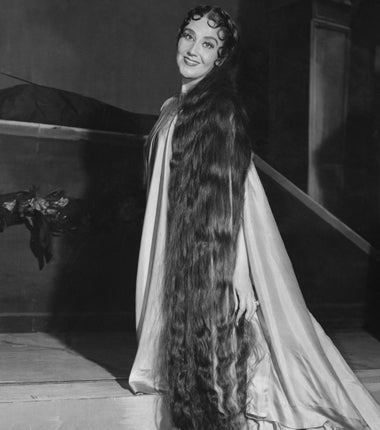Blanche Thebom: Mezzo-soprano lauded for her interpretations of Wagner

Your support helps us to tell the story
From reproductive rights to climate change to Big Tech, The Independent is on the ground when the story is developing. Whether it's investigating the financials of Elon Musk's pro-Trump PAC or producing our latest documentary, 'The A Word', which shines a light on the American women fighting for reproductive rights, we know how important it is to parse out the facts from the messaging.
At such a critical moment in US history, we need reporters on the ground. Your donation allows us to keep sending journalists to speak to both sides of the story.
The Independent is trusted by Americans across the entire political spectrum. And unlike many other quality news outlets, we choose not to lock Americans out of our reporting and analysis with paywalls. We believe quality journalism should be available to everyone, paid for by those who can afford it.
Your support makes all the difference.The American mezzo-soprano Blanche Thebom was not only a fine singer with a lovely voice, she was also a very beautiful woman with a superb figure and amazing hair that, when let down, hung well below her knees. Though she sang mostly in the United States, appearing at the Metropolitan, New York, for 22 seasons, as well as in Chicago, San Francisco, Dallas and other cities, she visited Glyndebourne in 1950 for an enchanting Dorabella in Mozart's Così fan tutte and Covent Garden for Dido in the first professional stage performance in the UK of Berlioz' Les Troyens in 1957. She excelled in the operas of Wagner, but her range was wide and her repertory included roles by Gluck, Handel, Verdi, Richard and Johann Strauss and Stravinsky.
Thebom was born in Monessen, Pennsylvania, in 1918. She studied in New York with Margaret Matzanauer and Edyth Walker, both famous singers in their day. She made her operatic debut in Philadelphia with the Metropolitan Opera Company as Brangäne in Tristan und Isolde on 28 November 1944 and repeated the role in New York on 14 December the same year.
During her first season she also sang Fricka in both Das Rheingold and Die Walküre as well as Waltraute in Götterdämmerung. Her other Wagner roles at the Metropolitan included Venus in Tannhäuser and Ortrud in Lohengrin, but Brangäne remained her favourite; she sang it in Chicago in 1946, in San Francisco in 1947 and on the 1952 recording conducted by Wilhelm Furtwängler in which Kirsten Flagstad sings Isolde.
Meanwhile Thebom enlarged her Metropolitan repertory with Laura in Ponchielli's La gioconda, Giulietta in Offenbach's Les Contes d'Hoffmann, Marina in Mussorgsky's Boris Godunov, Amneris in Verdi's Aida, the title role of Thomas' Mignon, Delilah in Saint-Saëns' Samson et Dalila, Herodias in Richard Strauss's Salome and Prince Orlovsky in Johann Strauss's Die Fledermaus. In 1953 she sang Baba the Turk, the Bearded Lady, in the US premiere of Stravinksy's The Rake's Progress, scoring a personal triumph. Having made her San Francisco debut as Laura, she repeated many of her Metropolitan roles there, but also gained some interesting new ones, including Oktavian in Richard Strauss' Der Rosenkavalier, Mother Marie in Poulenc's Dialogues des Carmélites and Orfeo in Gluck's Orfeo ed Euridice.
Her appearance as Dorabella at Glyndebourne in 1950 was a great success. Conducted by Fritz Busch and directed by Carl Ebert with Sena Jurinac as Fiordiligi, it was a particularly enjoyable performance of Così fan tutte in which the American visitor fitted perfectly.
The first professional stage performances of The Trojans (the opera was sung in English) were even more memorable. Conducted by Rafael Kubelik, then music director of the Royal Opera and directed by John Gielgud, with Jon Vickers as Aeneas opposite Thebom's Dido, the production aroused enormous interest in operatic circles.
The eight performances, opening on 6 June 1957, were all sold out, with people coming from all over Europe and even further afield. Thebom sang the love music most beautifully, and if she could not quite express the outrage of the abandoned queen after the departure of Aeneas, she looked magnificent in her death scene at the end, the famous hair falling like a curtain around her. There were five more performances of The Trojans at Covent Garden in the autumn 1958.
Thebom continued singing at the Metropolitan until the 1966-67 season, then became general manager of the short-lived Atlanta Opera Company in 1968. Later she retired to San Francisco.
Elizabeth Forbes
Blanche Thebom, opera singer; born Monressen, Pennsylvania 19 September 1918; married Richard Metz; died San Francisco 23 March 2010.
Join our commenting forum
Join thought-provoking conversations, follow other Independent readers and see their replies
Comments